Magento B2B Quote Explained: How to Import, Export & Manage Negotiable Quotes in Magento 2
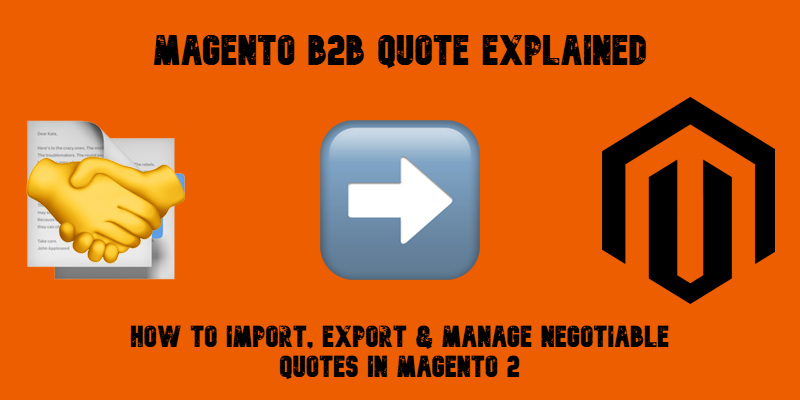
Managing Magento B2B quote data doesn’t have to be a manual nightmare. Whether you’re migrating to a new B2B store or integrating with a third-party platform, handling Magento 2 quotes can quickly become time-consuming, especially since the default Magento tools don’t support importing or exporting negotiable quotes. That’s where most store owners hit a wall.
But what if you could automate the entire process of transferring Magento B2B quotes with just a few clicks?
In this guide, we’ll walk you through the most efficient way to import and export Magento 2 B2B quotes, saving hours of manual work and ensuring data accuracy. We’ll start with what negotiable quotes are and how the quote workflow operates in Magento 2. Then, we’ll dive into how to structure your import files, streamline your export process, and unlock the full potential of Magento quote management.
Let’s simplify your Magento quote operations, starting now.

Table of contents
- What is a Magento B2B Quote?
- Native Magento 2 Quote Functionality: An Overview
- Magento 2 B2B Quote Workflow: Step-by-Step Guide
- How to Prepare a Magento 2 B2B Quote for Negotiation
- How to Decline a Magento 2 B2B Quote Request
- Challenges of Managing Magento B2B Quotes Manually
- How to Import Magento B2B Quotes Efficiently
- How to Export B2B Negotiable Quotes from Magento 2
- Tips for Optimizing Magento B2B Quotes for Sales Teams
- Final Words: Streamline Magento B2B Quote Workflows
- Magento B2B Quote FAQ: Learn More About Magento 2 Negotiable Quotes
What is a Magento B2B Quote?
A Magento B2B quote is a powerful feature within the Magento quote system that enables flexible pricing negotiations between buyers and sellers. Built into Magento 2 Commerce, this tool streamlines the B2B sales process by allowing customers to request custom quotes for large or complex orders — an essential workflow in wholesale, manufacturing, and other business-focused industries.
Instead of fixed pricing, a Magento 2 quote lets both parties collaborate on the terms of the deal. Buyers can add products to their cart, request a quote, suggest quantity changes, or ask for discounts. Sellers, in turn, can respond with adjusted pricing, offer counter-discounts, or propose alternative terms. We will describe this process in more detail in the next section.
This level of interaction makes Magento B2B quotes indispensable for businesses that rely on personalized pricing, high-volume transactions, or long-term customer relationships.
Native Magento 2 Quote Functionality: An Overview
The Magento 2 quote system — available in Adobe Commerce with B2B features — offers built-in functionality for managing negotiable quotes between buyers and sellers. This feature is especially valuable in B2B industries like wholesale, distribution, and manufacturing, where fixed pricing models often don’t align with complex customer needs.

🧾 How Magento 2 Quotes Work
A Magento negotiation quote can be initiated either by a company buyer from the storefront or by a sales representative directly within the admin panel. Once a quote request is submitted, the negotiation process begins, and the quote is added to the Quotes grid in the backend. This grid provides full visibility into all active quotes and their statuses, including a log of communication between both parties.
Buyers can:
- Add products to their cart
- Submit a quote request or save it as a draft
- Monitor all activity under My Quotes in their account dashboard
Sellers (sales reps or admins) can:
- Create quotes on behalf of company accounts
- Save drafts or submit quotes directly to buyers
- Review, modify, and respond to buyer requests via the admin Quotes grid
The negotiation process continues in a structured back-and-forth. Buyers and sellers take turns submitting changes or comments — Magento 2 enforces this turn-based system so only one party can respond at a time. Once a mutually acceptable price is reached, the buyer can convert the quote into an order and proceed to checkout. At that point, the quote becomes fixed — no further edits or discounts can be applied.
If either side declines the offer, the quote is closed and cannot be reactivated.
⚙️ Magento 2 B2B Quote Functionality General Overview
To leverage Magento 2 quotes for B2B use, follow these steps:
- Set up your store on Adobe Commerce (Magento 2 Commerce).
- Install the official B2B for Adobe Commerce extension.
- Enable company accounts from the Magento admin.
- Activate the Negotiable Quote feature from the B2B configuration.
- Assign quote management permissions to specific admin roles via System → Permissions → User Roles → Sales → Operations → Quotes.
Once configured, your store is ready to support personalized pricing workflows via the Magento quote system, improving your B2B sales experience and customer satisfaction.
Magento 2 B2B Quote Workflow: Step-by-Step Guide
To fully leverage the Magento B2B quote system, you need to enable and understand how negotiable quotes work across both the storefront and admin panel. Below is a clear, step-by-step breakdown of how to activate, create, manage, and finalize Magento 2 quotes for B2B customers.
✅ Step 1: Enable Magento 2 B2B Quotes
Before creating negotiable quotes, you must enable the B2B quote functionality in Magento 2.
If your store is already running on Adobe Commerce with company accounts and the B2B module installed, follow these steps:
- Navigate to: Stores → Configuration → General → B2B Features
- Set Enable B2B Quote to Yes
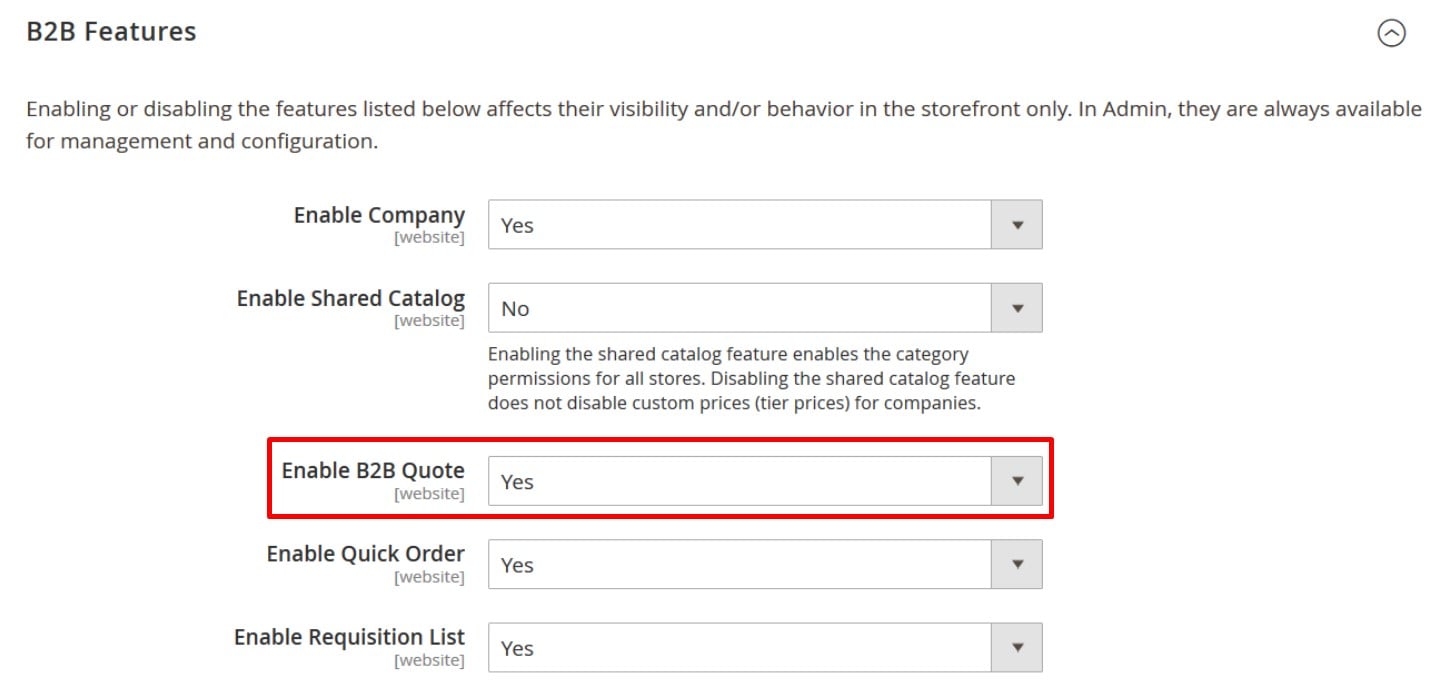
This activates the Magento negotiation quote feature, allowing your customers to request custom pricing directly from the shopping cart.
🧾 Step 2: Create a Magento B2B Negotiable Quote
From the Storefront (Buyer-Side): Customers can request a quote by adding products to their cart and clicking “Request a Quote” in the summary section. They can:
- Add a quote name
- Leave comments
- Choose to submit or save the quote as a draft
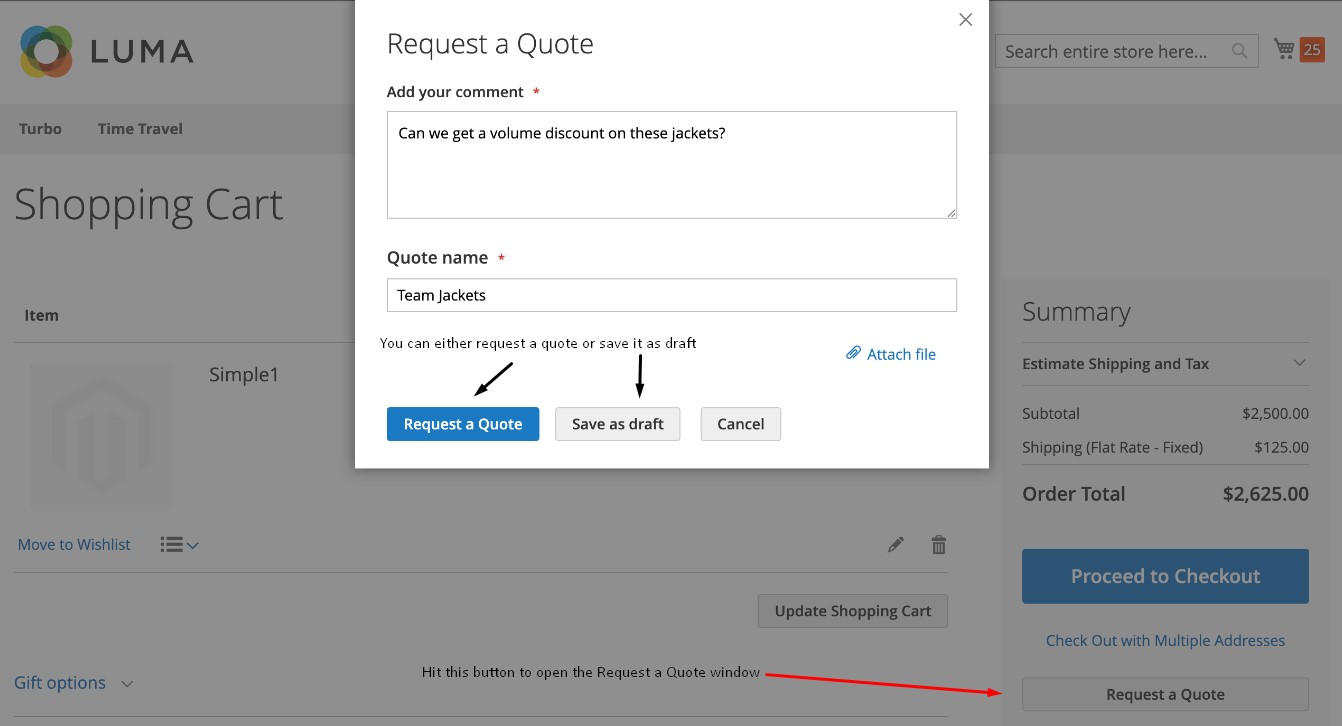
Submitted quotes appear in the My Quotes section of the customer’s account. The assigned sales representative is instantly notified via email, and the quote appears in the admin grid with the status New.
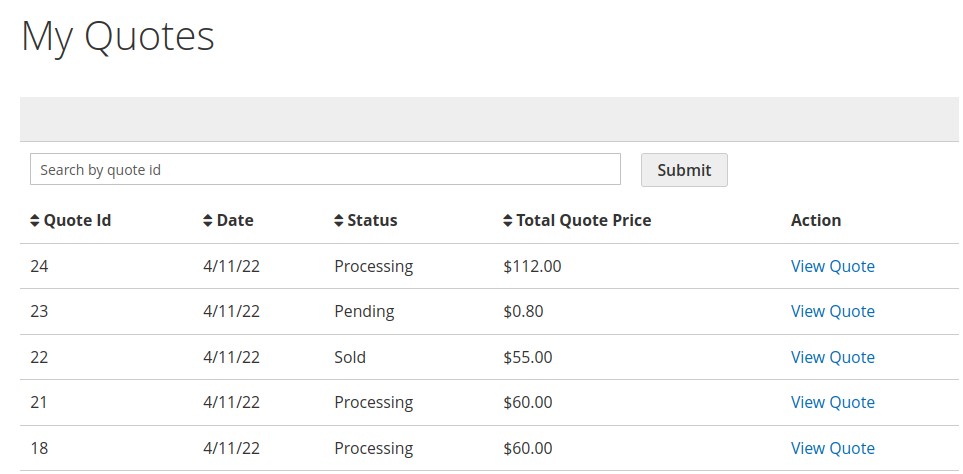
From the Admin Panel (Seller-Side): Sales reps can create quotes on behalf of a company account:
- Go to Sales → Quotes → Create New Quote

- Select the customer account
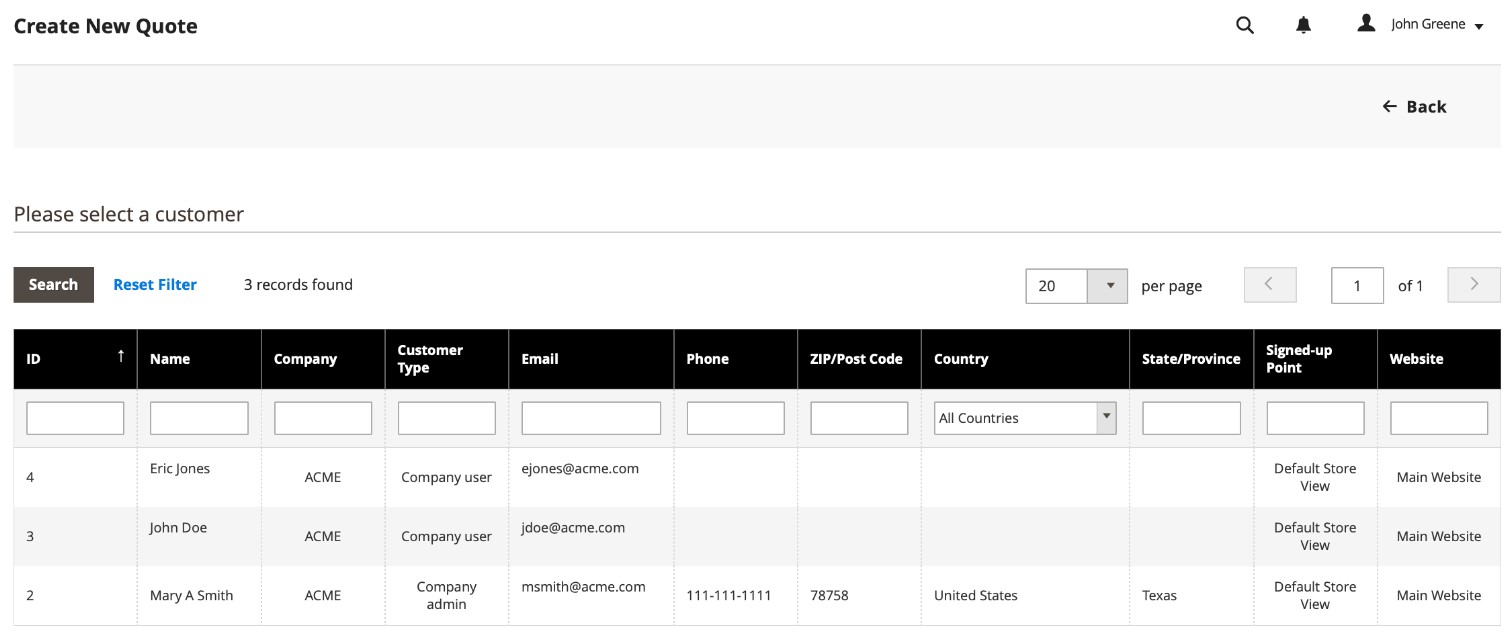
- Add products, apply discounts, and leave internal notes
- Save the quote as a Draft, or send it to the buyer to begin negotiation
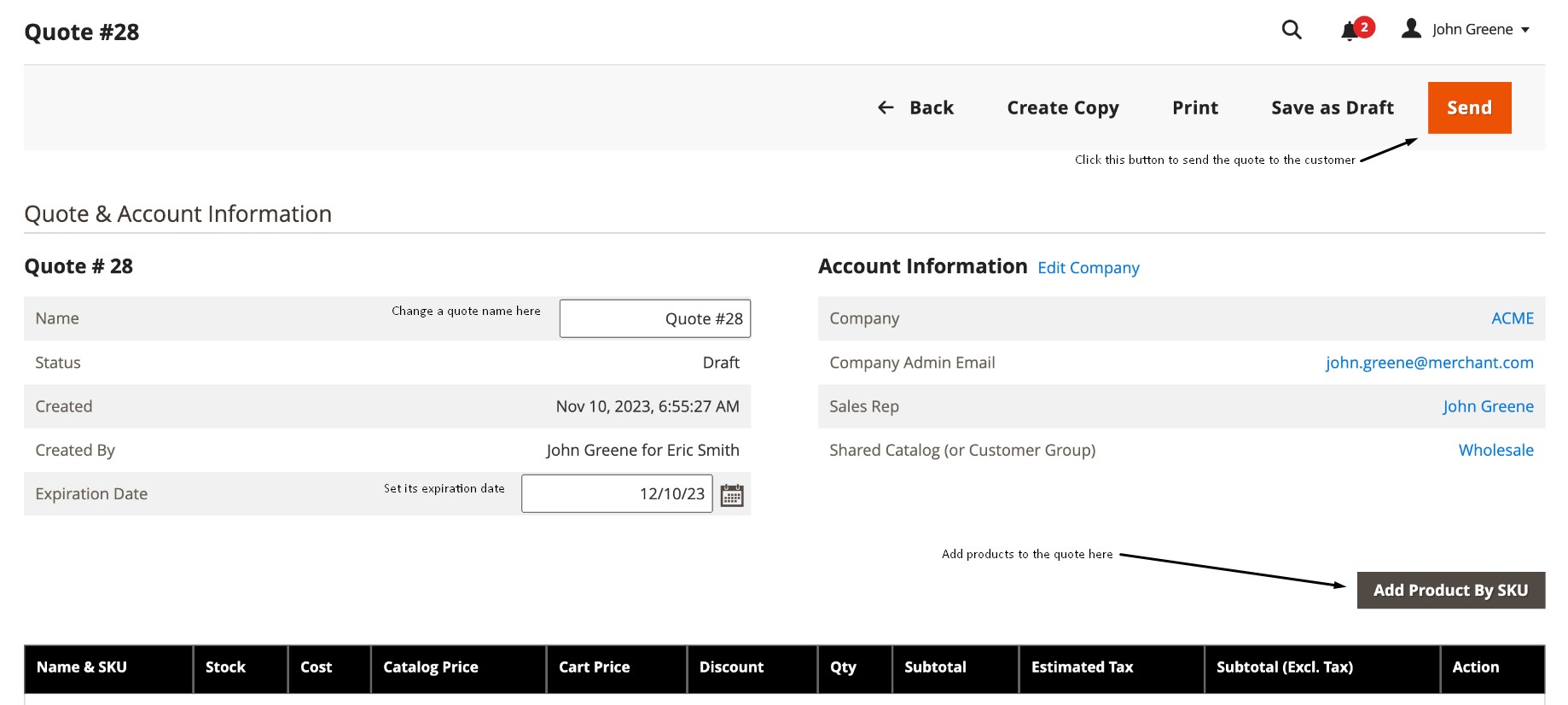
Once submitted, the quote status changes to Submitted, and the buyer can review and respond. Only one party can modify the quote at a time, ensuring a structured and trackable negotiation process.
🤝 Step 3: Review & Negotiate the Magento Quote
When a Seller Responds to a Buyer’s Quote:
- The quote status updates to Pending
- The buyer is temporarily locked from editing the quote
- The seller can apply discounts, add comments, and send a response (all these processes are described below)
- The buyer receives an email notification
When a Buyer Responds to a Seller’s Quote:
- The buyer can access the quote from the My Quotes section or via email
- They may update product quantities, leave notes, or remove items
- Any changes must be submitted back to the seller for review
This back-and-forth process continues until a price agreement is reached or the quote is declined. Both parties alternate control of the quote to maintain order and transparency.
🛒 Step 4: Convert Quote to Order & Checkout
Once both parties agree on the pricing and conditions, the buyer can accept the offer and proceed to checkout. At this stage:
- The Magento 2 quote becomes locked and cannot be changed
- No additional discounts or adjustments can be applied
- The quote is finalized and converted into a standard Magento order
This workflow ensures accurate pricing, efficient negotiation, and a professional B2B purchasing experience directly within the Magento quote system.
How to Prepare a Magento 2 B2B Quote for Negotiation
Once you’ve created a draft Magento B2B quote in the admin panel and added the necessary products, it’s time to fine-tune the offer before sending it to the buyer. This stage involves applying discounts, customizing pricing, and leaving detailed communication notes — all essential parts of the Magento quote negotiation workflow.
Here’s how to prepare your Magento 2 negotiable quote like a pro:
🔢 Apply Line Item Discounts in Magento Quotes
You can offer product-specific pricing directly within the quote grid. To apply a discount to individual items:
- In the product grid, click Select Action → Discount Item
- In the Discount Line Item window, choose a Discount Type:
- Percentage
- Fixed Amount
- Proposed Price
- Enter the discount value
- Optionally, lock the item price to prevent additional quote-level discounts from being applied to this line
- Click Confirm
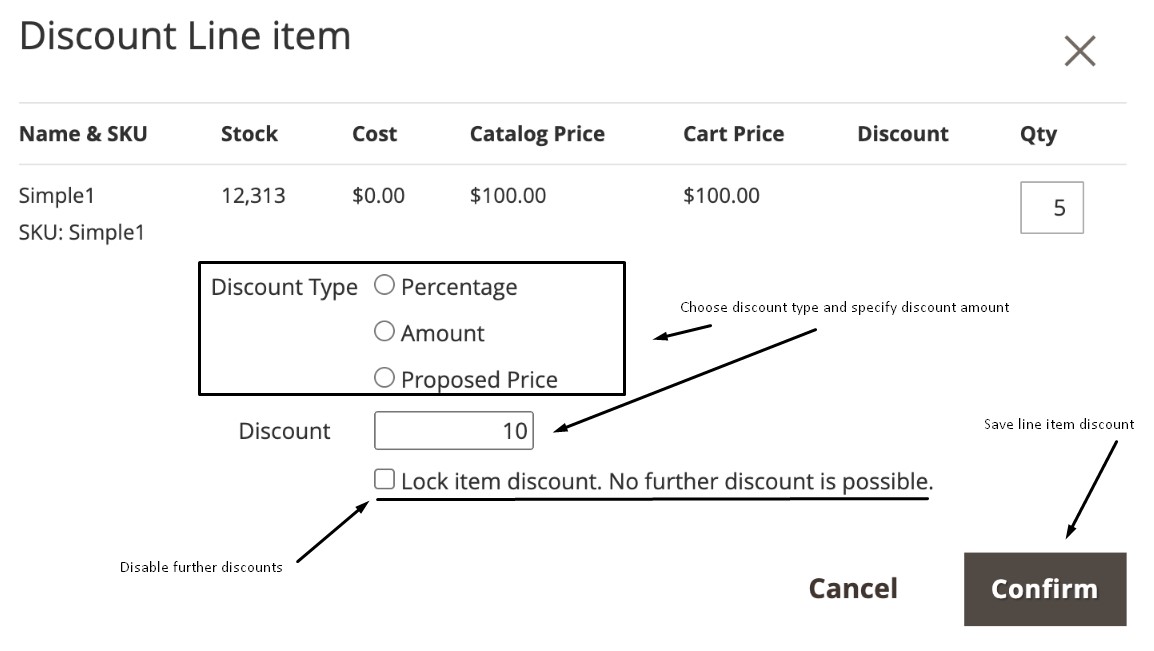
The updated pricing appears instantly in the product grid, giving the buyer a clear view of adjusted item-level prices.
💰 Apply a Quote-Level Discount
To apply a discount to the entire Magento 2 quote, follow these steps:
- Scroll to the Quote Totals section
- Under Negotiated Price, choose the discount method:
- Percentage Discount
- Amount Discount
- Proposed Total Price (Note: This option disables all line item discounts)
- Enter the value and confirm
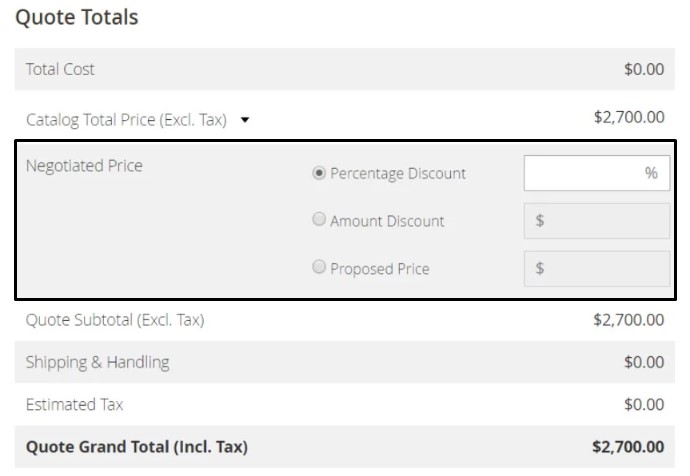
The product grid will automatically recalculate totals to reflect the applied quote-level pricing, ensuring transparency before submission.
📝 Add Comments & Attachments for the Buyer
Clear communication is crucial in B2B negotiations. Magento makes it easy to add context:
- Go to the Negotiation → Comments tab
- Add a personalized message for the buyer
- Upload any supporting files (e.g., spec sheets, contracts, or additional terms)

These details help build trust and clarify the terms of your offer.
📤 Submit the Magento B2B Quote to the Buyer
Once everything is in place, click Send Quote. The quote status will change to Submitted, and the buyer will receive an automatic email notification inviting them to review, respond, or propose changes.
By preparing your Magento B2B quote thoroughly — using precise discounts and clear communication — you significantly improve the chances of a faster, more successful negotiation.
How to Decline a Magento 2 B2B Quote Request
No Magento B2B quote guide is complete without covering what to do when a deal isn’t moving forward. In some cases, declining a quote is the right business decision, whether due to pricing limitations, inventory issues, or an unqualified lead.
Here’s how to professionally decline a Magento 2 quote request:
- Open the Quotes grid in the Magento admin.
- Select the quote with “Open” status that you want to decline.
- From the Actions dropdown, choose Declined.
- Enter a brief explanation in the comment box—this message will be shared with the buyer.
- Click Confirm to finalize the action.
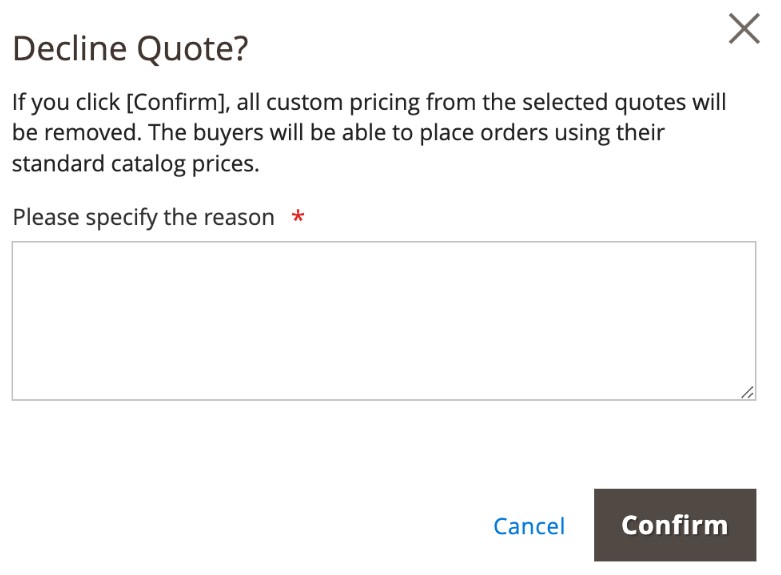
⚠️ Note: Only quote requests with “Open” status can be declined. Once the negotiation process has started, the quote must be closed through the standard negotiation flow.
By handling declined Magento quotes with transparency and clear communication, you maintain a positive buyer experience, even when the answer is no.
Challenges of Managing Magento B2B Quotes Manually
While the built-in Magento B2B quote functionality is powerful, managing quotes manually can quickly become a bottleneck, especially as your business scales. Without automation or advanced tools, the process is prone to inefficiencies that can affect both sales performance and customer satisfaction.
Here are the key challenges of manual quote handling in Magento 2:
⏱️ Time-Consuming and Repetitive Tasks
Creating, reviewing, and updating each Magento 2 quote individually takes significant time, especially when working with large product catalogs or high-volume requests. Sales teams often waste hours on tasks that could easily be automated, like adding SKUs, applying discounts, or sending responses.
💸 Risk of Pricing Errors
Manual data entry increases the likelihood of mistakes. Whether it’s entering the wrong discount, omitting a product, or miscalculating totals, a single pricing error in a Magento B2B quote can result in lost revenue or a damaged client relationship.
📉 Lack of Bulk Quote Management
One of the biggest Magento 2 quote limitations is the lack of native support for bulk actions. There’s no way to import multiple quotes, update them in bulk, or export data for reporting. This forces sales teams to handle each quote one by one — a serious drawback for fast-moving B2B operations.
📂 Fragmented Communication
Magento’s default quote system offers basic comment functionality, but it lacks a centralized view of all communication across quotes. This can lead to delays, missed messages, and disjointed customer interactions.
To overcome these limitations, many businesses turn to import/export solutions that streamline Magento B2B quote management — freeing up sales reps to focus on closing deals, not chasing spreadsheets.
How to Import Magento B2B Quotes Efficiently
By default, Magento 2 does not support quote import functionality, leaving store admins stuck with time-consuming manual work. But there’s good news: you can streamline the entire Magento B2B quote import process using the Improved Import & Export for Magento 2 with the B2B Add-On.
This powerful extension allows you to import Magento B2B quotes in bulk using flexible formats like CSV, XLSX, ODS, or Google Sheets, saving hours of work and eliminating errors.
🧾 Step 1: Download the Sample Magento 2 Quote CSV
Before starting your import, download the. This spreadsheet includes all required columns, sample values, and comments explaining each attribute used in the import.

Supported file formats:
- CSV
- XLSX
- ODS
- Google Sheets
🧠 Step 2: Understand Magento 2 Quote Attributes
Each row in your file represents a quote or a related comment. Below are key attributes required for a successful Magento B2B quote import:
| Attribute Name | Reference | Values | Value Example |
| increment_id | Increment ID of the quote. It is used for internal identification purposes. | Can be any UNIQUE value. Ensure the value is unique and can be found later. This unique identifier can be entered manually or generated using a formula.
increment_id is used to later identify this particular quote you import. |
10001 |
| store_id | The ID of the store view the quote is available. | Make sure to add only existing store view IDs | 10 |
| customer_email | The email of the customer account the quote belongs to | Make sure that the quote belongs to the existing customers. Otherwise, errors may occur. | john@doe.com |
| item:sku | SKUs of the items in the cart | Make sure to add only the items from the product catalog available for the customer | ITM001 |
| item:qty | Qty of the item added to the cart | Only numerals are allowed. Make sure you do not add qty that exceeds the product stock value. | 100 |
| item_option:code | Code of the product option that is added to the cart | Codes of the complex product variations. Such as variations of configurable products. | |
| item_option:value | Value of the product option that is added to the cart | Values of the complex product variations. Such as variations of configurable products. | |
| negotiable:negotiated_price_type | Negotiated Price type. This field is optional. | The following values are allowed: 1 – Percentage Discount 2 – Amount Discount 3 – Proposed PriceIf no value is specified, ‘Percentage Discount’ – 1 – will be used as a default value. |
2 |
| negotiable:negotiated_price_value | Negotiated Price value. This field is optional. | Only numerals allowed | 200 |
| negotiable:quote_name | Name of the negotiable quote the customer specifies when requesting a discount | Can be any value | John’s quote |
| negotiable_comment:creator_type | Defines whose comment it is. The comments can be left by a store administrator and customers. This field is optional. | Allowed values: 2 – Store Administrator 3 – CustomerWorks in conjunction with the ‘negotiable_comment:creator_id‘ attribute. Where the ID of the commenter must be specified. |
3 |
| negotiable_comment:creator_id | ID of either an admin user or a customer. This field is optional. | Only numerals are allowed. Works in conjunction with the ‘negotiable_comment:creator_type‘ attribute. | 11 |
| negotiable_comment:comment | Comment for the negotiable quote. From either an admin user or a customer. This field is optional. | Any value is allowed.Works with ‘negotiable_comment:creator_type‘ and ‘negotiable_comment:creator_id‘ attributes. | 12 |
| negotiable_comment:created_at | The date the comment was added to the negotiable quote.This field is optional. | Only date and time values are allowed. The format is YYYY-MM-DD HH:MM:SS | 2018-11-01 17:16:16 |
| negotiable_comment_attachment:file_name | The name of the file attached to the negotiable quote comment. | Can be any value. Make sure to specify the full file name, including file type. | file_sample.png |
| negotiable_comment_attachment:file_path | Path to the file attached to the negotiable quote comment | Can be any value. Make sure to specify a path refering to the root Magento 2 catalog – Magento 2 installation folder. | pub/images/ |
Use a separate row for each quote comment and reference the same increment_id.
⚠️ Quote Import Considerations
When importing negotiable quotes to Magento 2:
- Only registered customers with quote permissions can be assigned.
- The increment_id field is mandatory and must be unique for each quote.
- Magento doesn’t generate unique quote IDs by default — this is handled by Firebear’s custom attribute that should be specified manually.
- Comments require a dedicated row per entry, associated by increment_id. You only need to specify the increment_id of the quote. The extension will understand that all comments belong to the specified increment_id until a new row with another increment_id is processed, then the extension will switch to this very increment_id.
🚀 Step 3: Run the Magento B2B Quote Import
To import Magento B2B quotes, follow these steps inside your Magento admin:
- Go to System → Improved Import / Export → Import Jobs → Add New Job
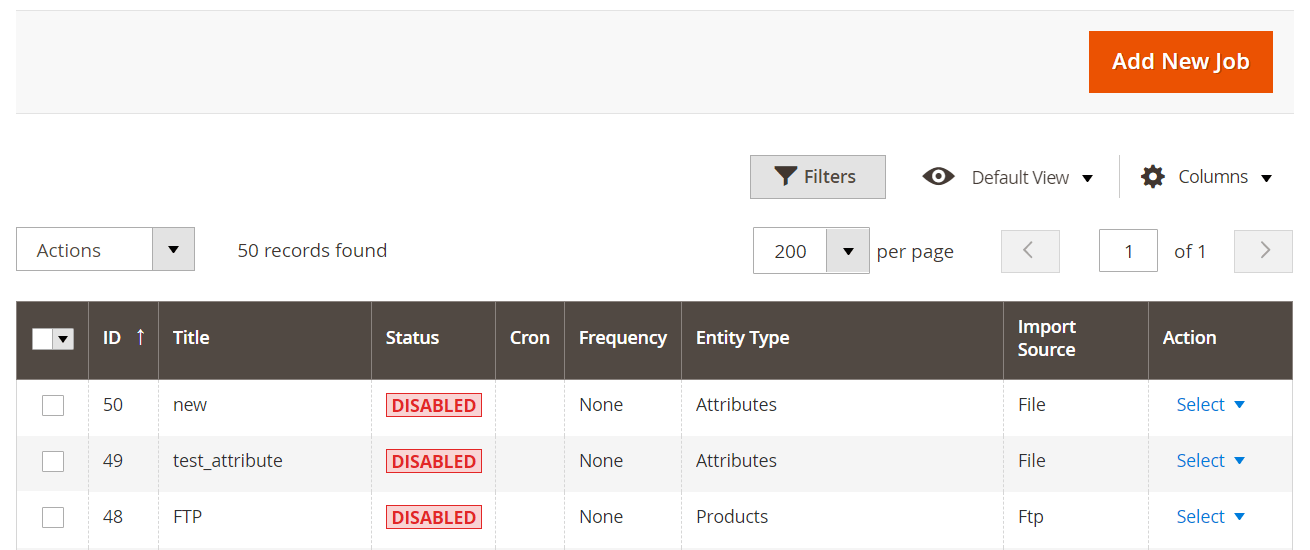
- Configure General Settings: Name your job and schedule it if needed
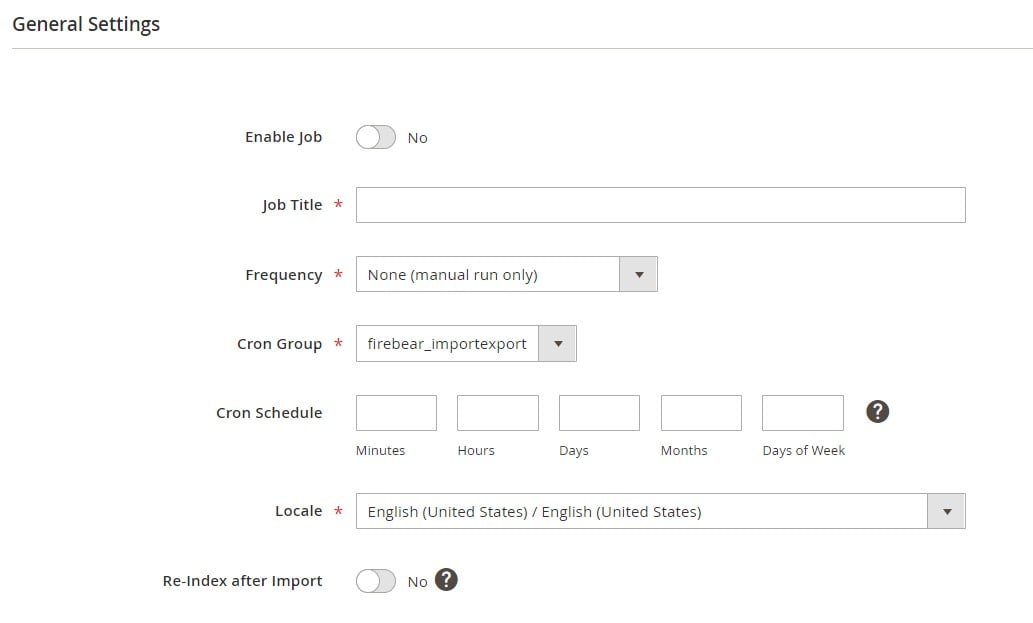
- In Import Settings, select Entity: Negotiable Quotes
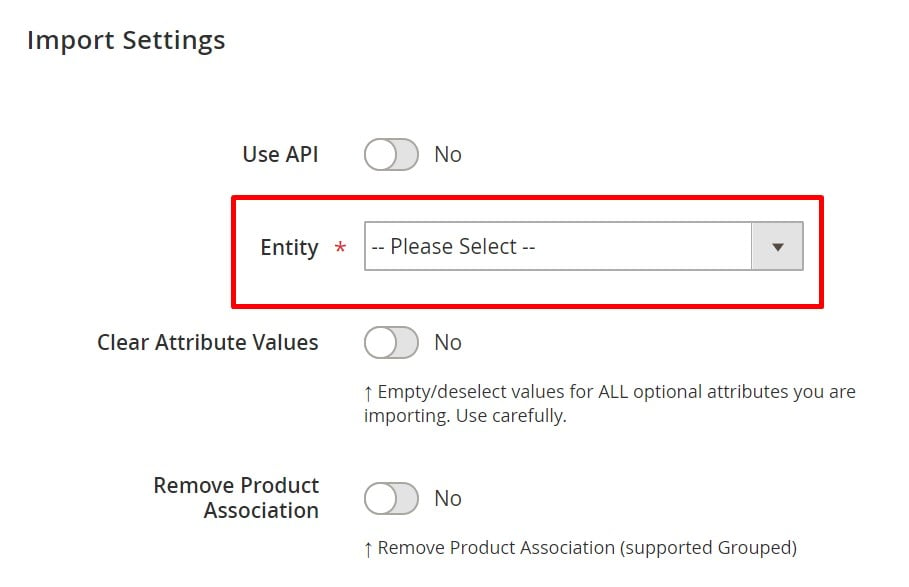
- Choose Import Behavior: Add/Update, Replace, or Delete.
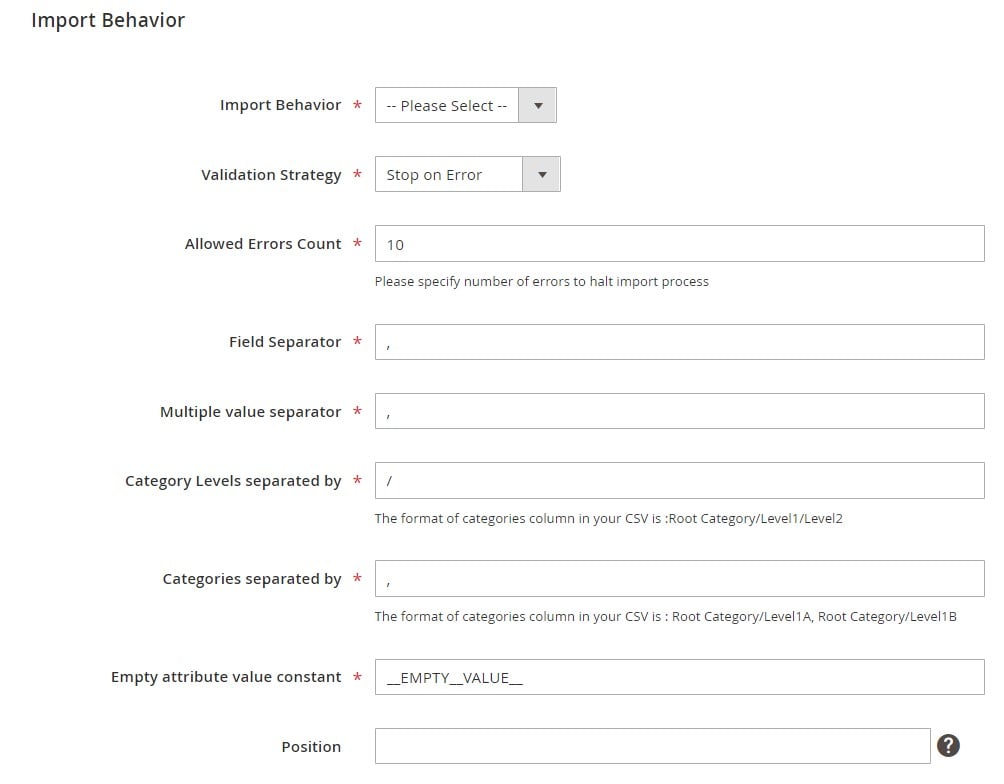
- Choose your file format and source (CSV, XML, XLSX, ODS; local file, FTP, Dropbox, Google Sheets, etc.)
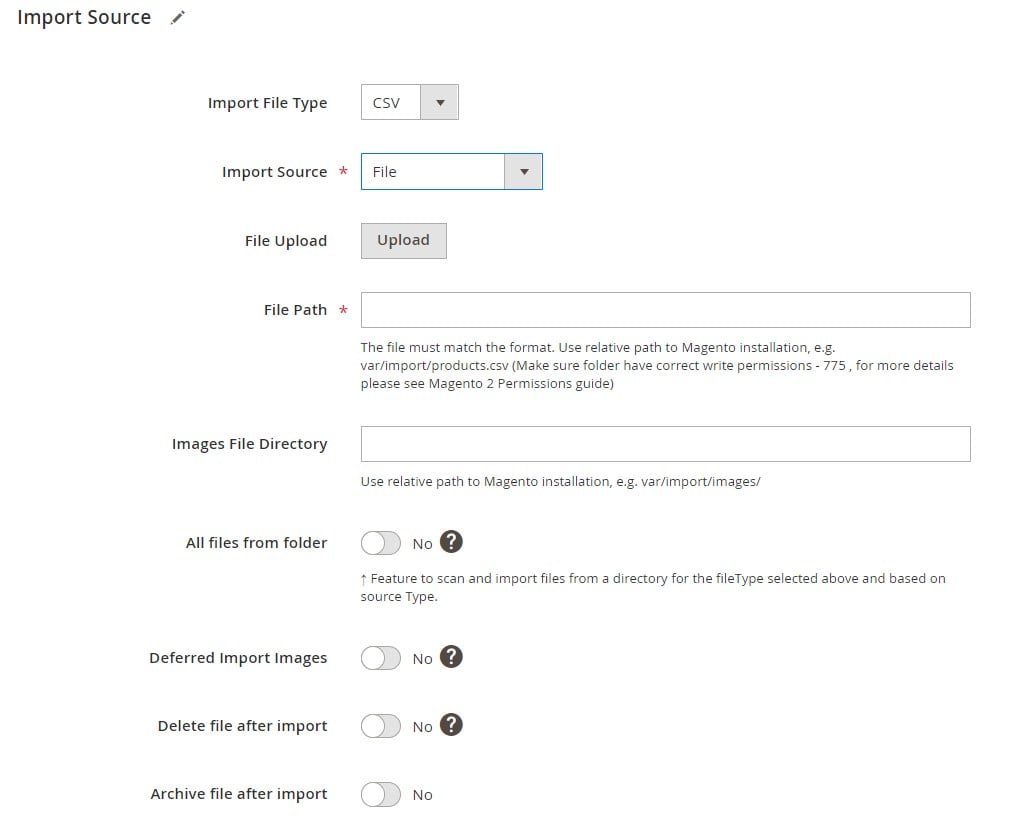
- Map attributes (if needed).
- Save and run the job
That’s it! The module will automatically process and insert your B2B quotes into Magento.
📘 Need more help? Explore the full documentation: Improved Import & Export Manual
By automating the Magento B2B quote import process, you eliminate repetitive tasks, reduce human error, and give your team more time to focus on sales, not spreadsheets.
How to Export B2B Negotiable Quotes from Magento 2
Need to export Magento B2B quotes for reporting, integration, or migration purposes? With the right tools, exporting negotiable quotes from Magento 2 becomes fast, flexible, and fully automated.
Let’s walk through how to export Magento 2 B2B quotes using the Improved Import & Export extension by Firebear.
Magento 2 B2B Quote Export Workflow
To export Magento B2B Quotes, follow these steps:
- Navigate to: System → Improved Import/Export → Export Jobs
- Create a New Export Job: Click “Add New Job”, enter a job name, and define scheduling options.
- Select a Magento 2 B2B Entity to Export: Negotiable Quotes
- Choose Output File Format: Export your data as CSV, XML, JSON, XLSX, or ODS — depending on your business requirements or external system compatibility.
- Select Export Destination: Define where the exported file should be delivered:
- Local storage
- Remote FTP/SFTP server
- Dropbox
- Google Drive or Sheets
- REST/SOAP API for third-party integrations
- Configure Optional Filters: You can filter the export by specific conditions — for example, only exporting B2B companies created in the last 30 days, or filtering shared catalogs by company.
Once saved, you can run the export manually or let it execute automatically based on your chosen schedule.
Why Use Improved Import & Export for Quote Export?
Here’s why merchants rely on this tool instead of Magento’s default exporter:
🔁 Automated Export Scheduling. Set up cron-based jobs or trigger exports based on system events — no need for manual downloads ever again.
📄 Multiple File Formats. Export Magento B2B quote data in any format your external system needs — not just CSV. Choose XLSX, XML, ODS, JSON, and more.
☁️ Flexible File Destinations. Push data directly to remote locations such as FTP servers, Google Drive, Dropbox, or even integrate via REST or SOAP API.
🧩 Attribute Mapping. Easily rename or transform attributes to match third-party system requirements. For example, change customer_email to CustomerEmail without altering your Magento data.
By using the Improved Import & Export tool, you not only simplify the export process but also future-proof your Magento 2 B2B quote management.
Tips for Optimizing Magento B2B Quotes for Sales Teams
Managing Magento quotes effectively is key to closing deals faster and delivering a better buying experience for B2B customers. While Magento’s native quote system provides solid negotiation tools, sales teams can achieve even more with smart workflows and advanced features.
Here are practical tips for B2B quote optimization that can boost your sales performance:
🎯 Filter Quotes by Customer Group or Priority
Use Magento’s admin filters to sort quotes based on customer groups (e.g., wholesalers, VIP clients, regional buyers). This allows sales reps to prioritize high-value accounts and personalize offers based on group-specific pricing or business rules.
Pro Tip: Add custom attributes or use tags to mark quotes as Urgent, Hot Lead, or Repeat Buyer to streamline follow-ups.
📋 Use Bulk Actions to Save Time
The Magento quote system doesn’t support bulk quote updates by default, but with tools like the Improved Import & Export extension, you can manage multiple quotes in one go. Bulk import/export allows you to:
- Update prices or discount structures across quotes
- Reassign quotes to different sales reps
- Archive or back up batches of quotes for auditing
This is especially helpful when seasonal pricing changes or large campaigns require mass updates.
🔍 Set Up Saved Views for Faster Access
In the Quotes grid, create saved views for different sales scenarios, such as:
- Quotes awaiting approval
- Drafts not yet submitted
- Recently declined or expired quotes
This lets your team jump directly into action without repetitive filtering.
🧾 Standardize Internal Notes and Templates
To avoid miscommunication, establish quote messaging templates for common scenarios, like discount offers, follow-ups, or rejection explanations. Use the Comments tab in each quote to maintain a clear, consistent record of communication.
📊 Analyze Quote Performance Over Time
Export Magento quotes regularly and track key performance indicators such as:
- Average time to close a quote
- Win/loss ratio by rep or product
- Most requested items by customer segment
These insights help fine-tune your quoting strategy and highlight where automation or training can make the biggest impact.
🧩 Full Compatibility with Magento B2B Modules
Firebear’s solution is built specifically to work with Magento 2 B2B shared catalog features and supports all related entities, including:
- Companies and company structure
- Requisition lists
- Negotiable quotes
- Shared catalogs
This means you can manage your entire Magento B2B workflow — from catalog creation to customer-specific pricing — using one centralized tool.
With these B2B quote optimization strategies, your team can turn Magento’s negotiation tools into a sales engine, shortening deal cycles, improving conversion rates, and delivering more value to your B2B customers.
Final Words: Streamline Magento B2B Quote Workflows
Managing Magento B2B quotes efficiently is critical to keeping your sales operations responsive, accurate, and scalable. Manual quote creation and updates can be error-prone and time-consuming, especially when dealing with large volumes of data or migrating between stores.
By automating the import and export of Magento 2 quotes, you reduce human error, eliminate repetitive tasks, and free your team to focus on what matters most: closing deals and supporting your customers.
The Improved Import & Export for Magento 2, combined with the powerful B2B Add-On, offers the most flexible and robust way to streamline your quote workflows. From scheduled imports and multi-format support to advanced attribute mapping and seamless integrations, this extension covers everything your B2B store needs.
Ready to simplify your Magento B2B quote operations?
👉 Contact us here and we’ll help you configure a tailored solution for your business.
Curious how to import Magento 2 configurable, bundled, or virtual products? We break down the process for every product type.
👉 Explore Magento 2 product import options
Magento B2B Quote FAQ: Learn More About Magento 2 Negotiable Quotes
1. What is a Magento B2B quote?
A Magento B2B quote is a negotiable pricing request between a buyer and seller in Magento 2 Commerce. It allows B2B customers to request custom prices for large or complex orders directly from the storefront or admin panel.
2. Can I import Magento 2 B2B quotes by default?
No, Magento 2 does not support importing B2B quotes out of the box. You need a third-party solution like the Improved Import & Export extension with the B2B Add-On to enable Magento B2B quote import functionality.
3. How do I export Magento 2 quotes?
You can export Magento 2 quotes using the Improved Import & Export extension, which supports automation, multiple formats, and third-party integrations.
4. What file formats are supported for importing Magento B2B quotes?
The Improved Import & Export extension supports CSV, XLSX, ODS, and Google Sheets for importing Magento B2B quote data. You can choose the format that best fits your workflow or third-party system requirements.
5. Can Magento quotes be edited after submission?
Magento 2 enforces a turn-based system. Only one party (either the buyer or the seller) can make changes at a time. Once a quote is submitted, the other party must respond before further edits are allowed.
6. What is the increment_id used for in Magento B2B quote import?
The increment_id is a unique identifier for each quote used during Magento B2B quote import. It helps the import tool group related data like comments and attachments under the correct quote record.
7. Can I automate Magento 2 B2B quote imports?
Yes, the Improved Import & Export extension allows you to automate Magento B2B quote imports using cron jobs or event-based triggers, ensuring consistent and hands-free data updates.
8. Why should I use the Improved Import & Export extension for Magento quotes?
The extension adds powerful features like multi-format support, attribute mapping, automation, and API integration, making it the most efficient way to manage Magento B2B quote imports and exports.
9. Can I import quotes for guest users in Magento 2?
No, Magento 2 only supports B2B quotes for registered customers. The customer account must already exist and be authorized to request negotiable quotes in your B2B settings.
10. Where can I get support for Magento B2B quote import issues?
You can contact the Firebear Studio team via this page for support with importing, exporting, or automating Magento B2B quotes using their extension and add-ons.

